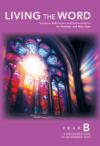Scripture Study for
The Most Holy Trinity
Exodus 34:4b–6, 8–9 / Daniel 3:52b / 2 Corinthians 13:11–13 / John 3:16–18
<< Back to LECTIONARY RESOURCES
Understanding the Word
By Br. John R. Barker, OFM
Much of the book of Exodus is concerned with answering the question “Who is the Lord?” In the deliverance from Egypt, provision in the wilderness, and establishment of the covenant, God is shown to be faithful, powerful, and wise. The present scene takes place shortly after the affair of the golden calf, which nearly ends the covenant relationship. Thanks to Moses, who reminds the Lord of his fidelity, the covenant has been renewed. It is against this background that the famous phrase must be understood: The God of Israel can be angered by human infidelity, but God’s mercy, grace, kindness, and fidelity far outshine that anger. This is who the Lord is.
Throughout his second letter to them, Paul has been admonishing the Corinthians to forsake the division and lack of fidelity to the gospel way of life that he has seen among them. He warns them to examine themselves to see if they are living in faith: “Test yourselves” (13:5). Despite the severe tone, he ends by exhorting them to rejoice—they have been saved by Christ. In that joy they should recognize their fellowship and act accordingly, with mutual encouragement, agreement, and peace. Then their community will be a sign of God’s love and peace. The letter ends with an invocation of Christ, God (the Father), and the Holy Spirit, one of the clearest “trinitarian” expressions in the New Testament.
In his conversation with Nicodemus, Jesus has told him that “no one can enter the kingdom of God without being born of water and Spirit” (3:5). That is, one must be (re)born from above. This is a gift from God that can only be accepted by believing that Jesus is God’s Son, given by God—both in the sense of the incarnation of the Word and in his death on the cross—so that those who do believe might have eternal life. In John, “eternal life” refers to a “abundant life” (10:10), a quality of life that can be lived on earth and after bodily death, rather than simply a “duration” of life after death.
